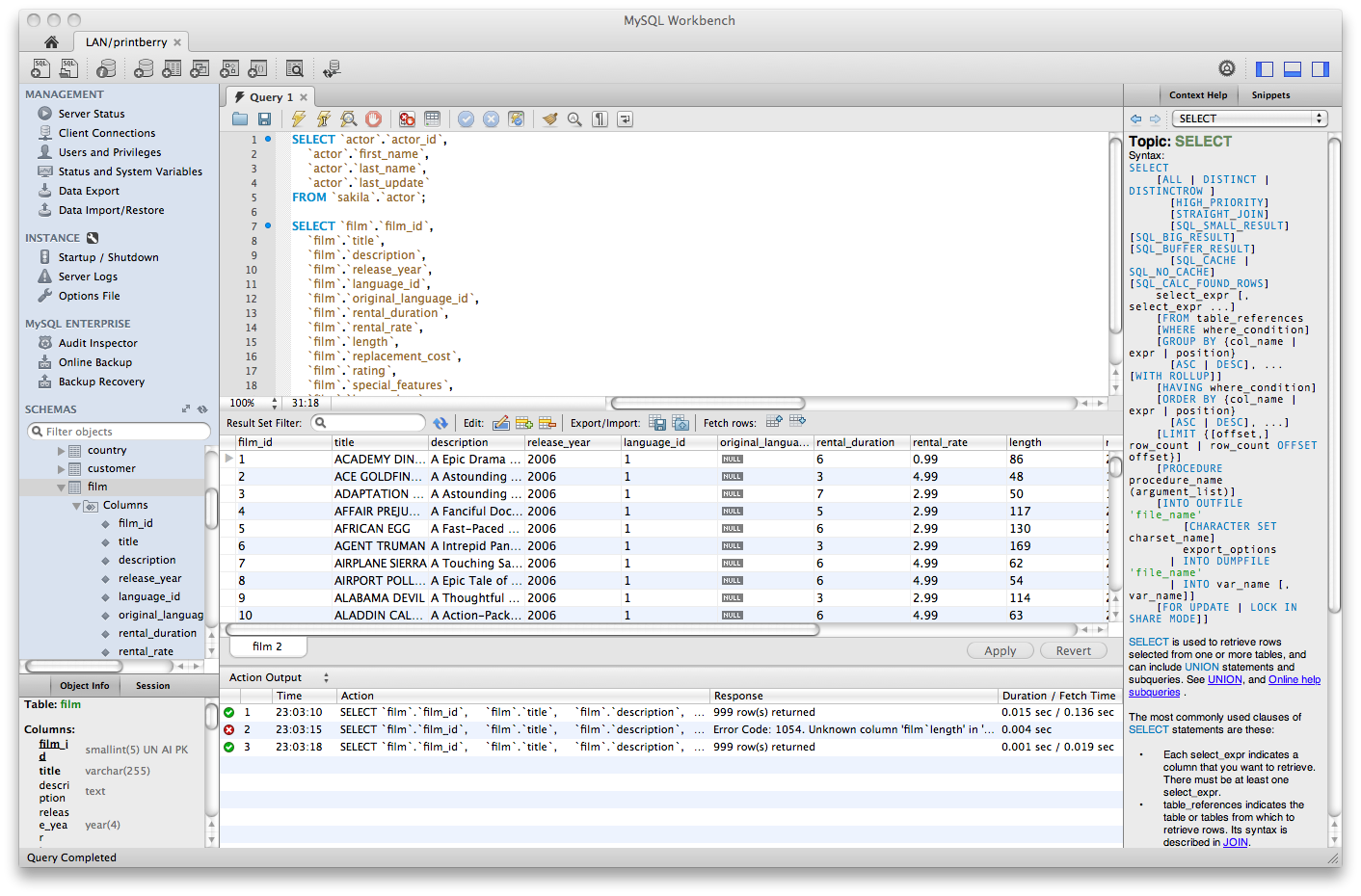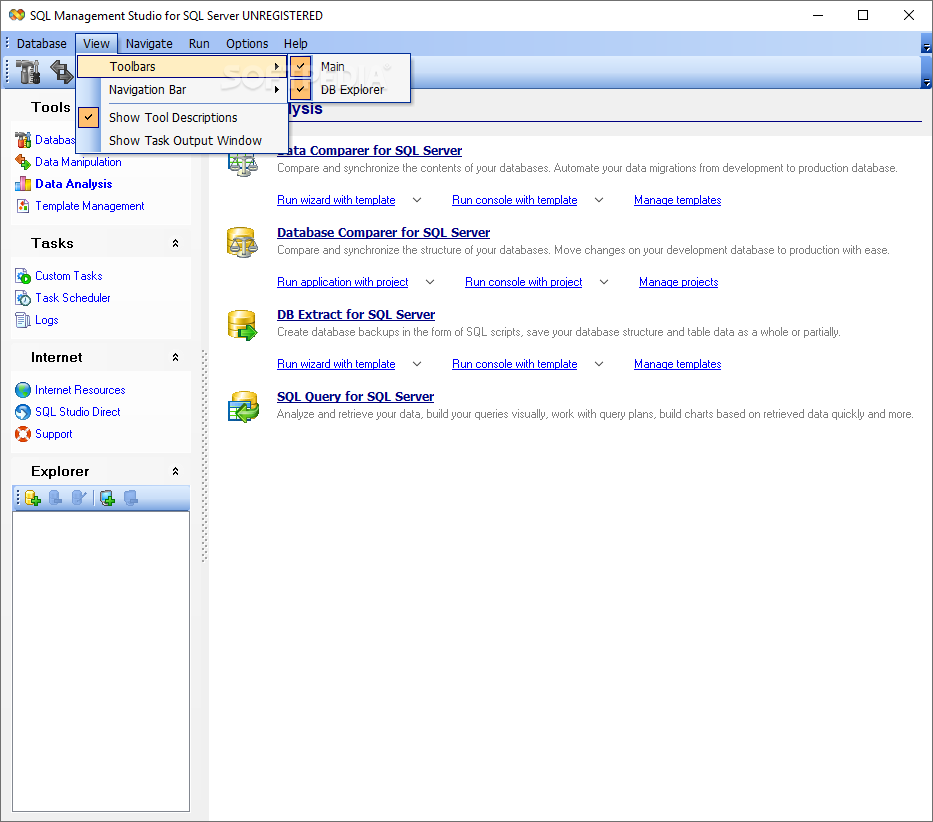-->
- Microsoft Sql Studio For Mac Download
- Sql Server Microsoft Management Studio
- Mac Sql Server Management Studio
- Microsoft Sql Studio For Mac Os
Applies to:

Microsoft has made SQL Server available for macOS and Linux systems. This is made possible by running SQL Server from a Docker container. Therefore, there's no need to install a virtual machine with Windows (which was the only way to run SQL Server on a Mac prior to SQL Server 2017). Microsoft SQL Server 2008 R2 Management Studio Express (SSMSE) is an integrated environment for accessing, configuring, managing, administering, and developing all components of SQL Server Express. This edition combines a broad group of graphical tools with a number of rich script editors to provide access to SQL Server to developers.
SQL Server Management Studio (SSMS) is an integrated environment for managing any SQL infrastructure. Use SSMS to access, configure, manage, administer, and develop all components of SQL Server, Azure SQL Database, and SQL Data Warehouse. SSMS provides a single comprehensive utility that combines a broad group of graphical tools with a number of rich script editors to provide access to SQL Server for developers and database administrators of all skill levels.
SQL Server Management Studio components
| Description | Component |
|---|---|
| Use Object Explorer to view and manage all of the objects in one or more instances of SQL Server. | Object Explorer |
| How to use Template Explorer to build and manage files of boilerplate text that you use to speed the development of queries and scripts. | Template Explorer |
| How to use the deprecated Solution Explorer to build projects used to manage administration items such as scripts and queries. | Solution Explorer |
| How to use the visual design tools included in Management Studio. | Visual Database Tools |
| How to use the Management Studio language editors to interactively build and debug queries and scripts. | Query and Text Editors |
SQL Server Management Studio for Business Intelligence
To access, configure, manage, and administer Analysis Services, Integration Services, and Reporting Services, use SQL Server Management Studio. Although all three business intelligence technologies rely on SQL Server Management Studio, the administrative tasks associated with each of these technologies are slightly different.
Note
To create and modify Analysis Services, Reporting Services, and Integration Services solutions, use SQL Server Data Tools (SSDT), not SQL Server Management Studio. SQL Server Data Tools (SSDT) is a development environment that is based on MicrosoftVisual Studio.
Managing Analysis Services Solutions Using SQL Server Management Studio
SQL Server Management Studio enables you to manage Analysis Services objects, such as performing back-ups and processing objects.
Management Studio provides an Analysis Services Script project in which you develop and save scripts written in Multidimensional Expressions (MDX), Data Mining Extensions (DMX), and XML for Analysis (XMLA). You use Analysis Services Scripts projects to perform management tasks or re-create objects, such as database and cubes, on Analysis Services instances. For example, you can develop an XMLA script in an Analysis Services Script project that creates new objects directly on an existing Analysis Services instance. The Analysis Services Scripts projects can be saved as part of a solution and integrated with source code control.
For more information about how to use SQL Server Management Studio, see Developing and Implementing Using SQL Server Management Studio.
Managing Integration Services Solutions Using SQL Server Management Studio
SQL Server Management Studio enables you to use the Integration Services service to manage packages and monitor running packages. You can also use Management Studio to organize packages into folders, run packages, import and export packages, migrate Data Transformation Services (DTS) packages, and upgrade Integration Services packages.
Managing Reporting Services Projects Using SQL Server Management Studio

Use SQL Server Management Studio to enable Reporting Services features, administer the server and databases, and manage roles and jobs.
You manage shared schedules by using the Shared Schedules folder, and manage report server databases (ReportServer, ReportServerTempdb). You also create a RSExecRole in the Master system database when you move a report server database to a new or different SQL Server Database Engine (SQL Server Database Engine). For more information about these tasks, see the following articles:
You also manage the server by enabling and configuring various features, setting server defaults, and managing roles and jobs. For more information about these tasks, see the following articles:
Non-English language versions of SQL Server Management Studio (SSMS)
Microsoft Sql Studio For Mac Download
The block on mixed languages setup has been lifted. You can install SSMS German on a French Windows. If the OS language doesn't match the SSMS language, the user needs to change the language under Tools > Options > International Settings. Otherwise, SSMS shows the English UI.
For more information about different locale with previous versions, reference Install non-English language versions of SSMS.

Sql Server Microsoft Management Studio
Support Policy for SSMS
- Starting with SSMS 17.0, the SQL Tools team has adopted the Microsoft Modern Lifecycle Policy.
- Read the original Modern Lifecycle Policy announcement. For more information, see Modern Policy FAQs.
- For information on diagnostic data collection and feature usage, see the SQL Server privacy supplement.
Cross-platform tool
SSMS runs on Windows (AMD or Intel) only. If you need a tool that runs on platforms other than Windows, take a look at Azure Data Studio. Azure Data Studio is a cross-platform tool that runs on macOS, Linux, as well as Windows. For details, see Azure Data Studio.
Mac Sql Server Management Studio
Get help
Next steps
Contribute to SQL documentation
Microsoft Sql Studio For Mac Os
Did you know that you could edit the content yourself? If you do so, not only will our documentation improve, but you'll also be credited as a contributor to the page.